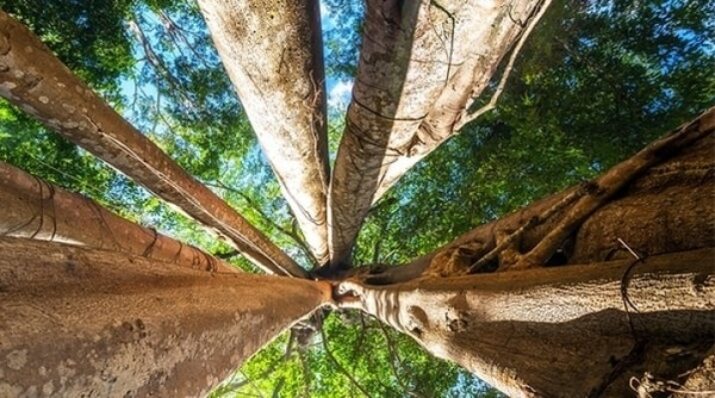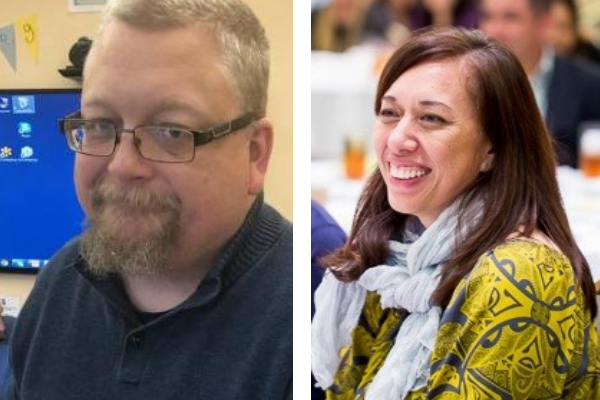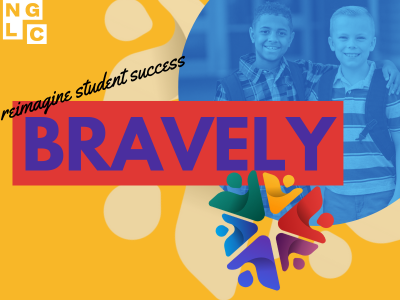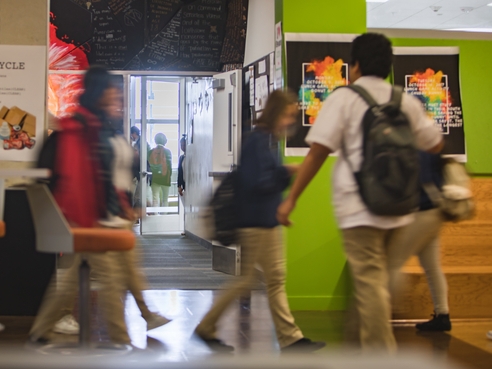Why Schools Need to Change
A Conversation about Education as an Ecosystem
Topics

Today’s learners face an uncertain present and a rapidly changing future that demand far different skills and knowledge than were needed in the 20th century. We also know so much more about enabling deep, powerful learning than we ever did before. Our collective future depends on how well young people prepare for the challenges and opportunities of 21st-century life.
An exploration of the important role of context and environment in school and learning, looking at the metaphors we use to describe K-12 education.
Reflection is a powerful tool for learning. Reflection in dialogue with another even more so. When educators are deep into the work of transforming learning and assessment, sometimes we can focus so intently on practice—the actions, the interactions, the pedagogy—that we neglect the bigger story. This article offers a celebration of reflection, dialogue, and the bigger story—and a bit of philosophy about education.
The authors, Cheryl Ka‘uhane Lupenui of The Kohala Center and Gary Chapin of the Center for Collaborative Education, invite you into their conversation about the metaphors we use to conceptualize education. Metaphors can cross cultural differences, sometimes when other kinds of bridges are hard to find. This particular conversation about the ecosystem metaphor of education created space for the authors to express both Western and indigenous Hawaiian cultures simultaneously.
The authors hope that readers will join in their exploration of the importance of context and environment in school and learning, that you will experience the almost-spiritual human connections this kind of dialogue can inspire, and that you will consider how metaphors have the power to limit us or open us up to new possibilities.

Gary Chapin and Cheryl Ka‘uhane Lupenui
Some time ago, Andrew Calkins and Kelly Young posted a piece on the EdSurge blog, examining the various metaphors and models that have been used for education in the past, and challenging us to envision a model for the next generation. That set the spark. At the March 2019 Assessment for Learning Project (ALP) convening in Louisville, Kentucky, we talked about this very topic and it emerged that we each had seen the EDUCATION::ECOSYSTEM metaphor as a powerful tool for understanding our work. The “ecosystem” metaphor is hardly new, but it has lately seemed more like a word out of marketing than pedagogy. For the two of us, the metaphor—if taken seriously—is profoundly powerful, inspiring, and, perhaps, unnerving. In the conversation below we explore this power and tease out the implications of EDUCATION::ECOSYSTEM.
Gary: When someone refers to a system as an “ecosystem,” they mean either that it’s organic (it has a life of its own) or it’s really really complicated. And both of those things are true. They are salient qualities of an ecosystem, but so what? Neil Postman once said (paraphrasing), “When you take an ecosystem and add a caterpillar to it, you don’t get the ecosystem plus the caterpillar. You get a new ecosystem.” He was pointing out that however we may choose to shift an ecosystem, the ecosystem has something to say about it.
Ecosystems are self-organizing. They are repositories of more creative energy than we, as leaders, could ever hope to control. In fact, the extent to which you try to control an ecosystem is the extent to which it sheds energy, diversity, and creativity. It becomes merely a garden. Ground that had once been extraordinarily and variently fertile is now used to produce very few things (e.g., asparagus) that are “of use” to us, and the rest is excluded. This seems to be a relevant comment on our attempts to “grow” kids in “useful” ways.
Where are you coming from, Cheryl, when you bring up ecosystems?
Cheryl: In the field of conservation, when we use the term ecosystem we think about the natural environment and how to turn our impact into positive ones for both man and nature. It seems like this lens might be equally relevant when we look at education and think of our impact on both student and teacher and our learning environment inclusive of family, school, community, and nature, of course. “Ecosystem” has a different shape and power than “system.” When we shift our language from an education system to an educational ecosystem, we enter into richer conversations (like ours!) that remind me that learning takes shape in and is shaped by our context.
Relationships are “success” in themselves and not a means to something.
Our ancestors lived this daily. Hawai‘i’s worldview is based on cycles of living where humans are not separate from their environmental relatives. Hence, there is no word for environment, nature, or natural in the Hawaiian language. This is where I’d like to come from in thinking of education as a natural, organic, and complex ecosystem. It leads me to a place where relationships are everything. Relationships are “success” in themselves and not a means to some thing. Ecosystems hold regenerative, cyclical processes that are sustainable and “feed” everyone!
Where does this take you, Gary?
Gary: You have reminded me of the poet Gary Snyder, who wrote in his anthology No Nature (1992), “Whatever [nature] actually is, it will not fulfil our conceptions or assumptions. It will dodge our expectations and theoretical models…. The greatest respect we can pay to nature is not to trap it, but to acknowledge that it eludes us and that our own nature is also fluid, open, and conditional.” We can—must—say the same for learning.
You have made me confront my own assumptions, Cheryl. Thank you for that. Until we talked, I had made the exact mistake you described—and that Snyder’s oeuvre decries—separating out Nature as other. By “ecosystem” I was referring to “the wild”—fecund and creative—and casting it in opposition to human systems, like farms, where the “ecosystem” is attenuated by human control and material needs. This is a version of the noble savage trope: wild is better! No. Decisions about the ecosystem are made by members of the ecosystem within the ecosystem and in relation to the ecosystem. Even in the most controlled farms, the farmer cannot make the asparagus grow. The asparagus will always have something to say about how things turn out, and all the farmer can do is talk (engagement!) with the roots and the stalk.
Oh, drat, I had hoped to get more grounded in this reply, and I seem to have gone further down the abstraction rabbit hole. Help me, Cheryl! Bring this back to schools!
Cheryl: I went further down the rabbit hole myself when I found out that the word “eco” comes from the Greek oikos, meaning “home, place to live.” And now my sense of family and home just got bigger and more inclusive. And now I find myself having to be more thoughtful about the impact my words and actions have on those around me (animate and inanimate) since we are living all under “one roof.” And I am thinking I am a better member of the community (including environmental kin) the more I know about myself and my community. And perhaps now I have a context that frames my learning in relation to the collective. And wouldn't it be great if my learning environments (like school!) helped me to understand my gifts and responsibilities as a positive contributor in this place I call home?
So, as I find myself back “at school,” I am starting to question whether you and I are talking about ecosystem as just a tool for understanding our work or as the nature of the work in itself. Are we framing learning in a way that has us not only pay attention to the larger world that we inhabit but actually honors (not controls or directs) the relationships and sacred processes that happen in our ecosystem? And what are the implications of designing our systems of education toward this end?
Lots of questioning, Gary; please tell me you have some answers!!
Gary: (First of all, why does the ecosystem of our conversation even HAVE a rabbit hole?) I hear you. Can we, in good conscience, deploy the EDUCATION::ECOSYSTEM metaphor? It makes demands of us that too many of our colleagues don’t seem willing to live up to. It’s enough to make me think you and I are radicals! Vive l'éco-système! Or, pardon the hubris, ola ka honua!
“Where we live should teach us how to live.” Similarly, “Where we learn should teach us how we learn.” Or “Who we teach should teach us how we teach.”
To live within an ecoystem one has to negotiate with it and collaborate with it every day—whether you recognize that fact, or not. There is a phrase I heard often in Hawai‘i: “Where we live should teach us how to live.” Similarly, “Where we learn should teach us how we learn.” Or “Who we teach should teach us how we teach.” We know this is where the magic is—in the learner in relationship to their why, to their where, and to us. That is our source of power, the ecosystem.
Phew. Now, I’m going to go out into my eco-system to kayak on Parker Pond, in Maine. Where I live has a lot to teach me. Thank you!
Cheryl: When I think back to where this conversation first began in Kentucky, we were looking at a “chapter” around education systems-level change. At the time I held an assumption that the system needs changing and it is up to us to make those changes. Words matter but just substituting the word “ecosystem” for “system” won’t stir real change or lessen our grip on the wheel, beyond just a start of a conversation. But as a wise friend and mentor taught me, “Not every conversation makes a difference, but any conversation could!” Now, THIS conversation with you has really helped me to dig deeper.
To move into ecosystem, we have to get our hands into the very soil that grows our keiki (or “children,” which includes plants, animals, and humans). We need to look far into the root system that nurtures its own as well as the whole extended household—be it garden, farm, forest, or any other place of feeding.
Shifting to an educational ecosystem both in context and content demands nothing less than a radically different mindset, infrastructure, pedagogy, assessments, etc. that all work together. It is a different way of being in education. Our dialogue points to a shared understanding that the ecosystem is always changing, with or without us.
Our desire to manage learning has no purpose in ecosystems. There are no one way transactions in ecosystems. There is no us-and-them—school separate from community separate from family. An ecosystem is host to uniquely rich exchanges that result in continuous learning cycles and life cycles for all its relations. EDUCATION::ECOSYSTEM. Radical you say? In the words of one of our insightful ALP team members, “Sometimes you have to get out of the pot to plant a forest!”




